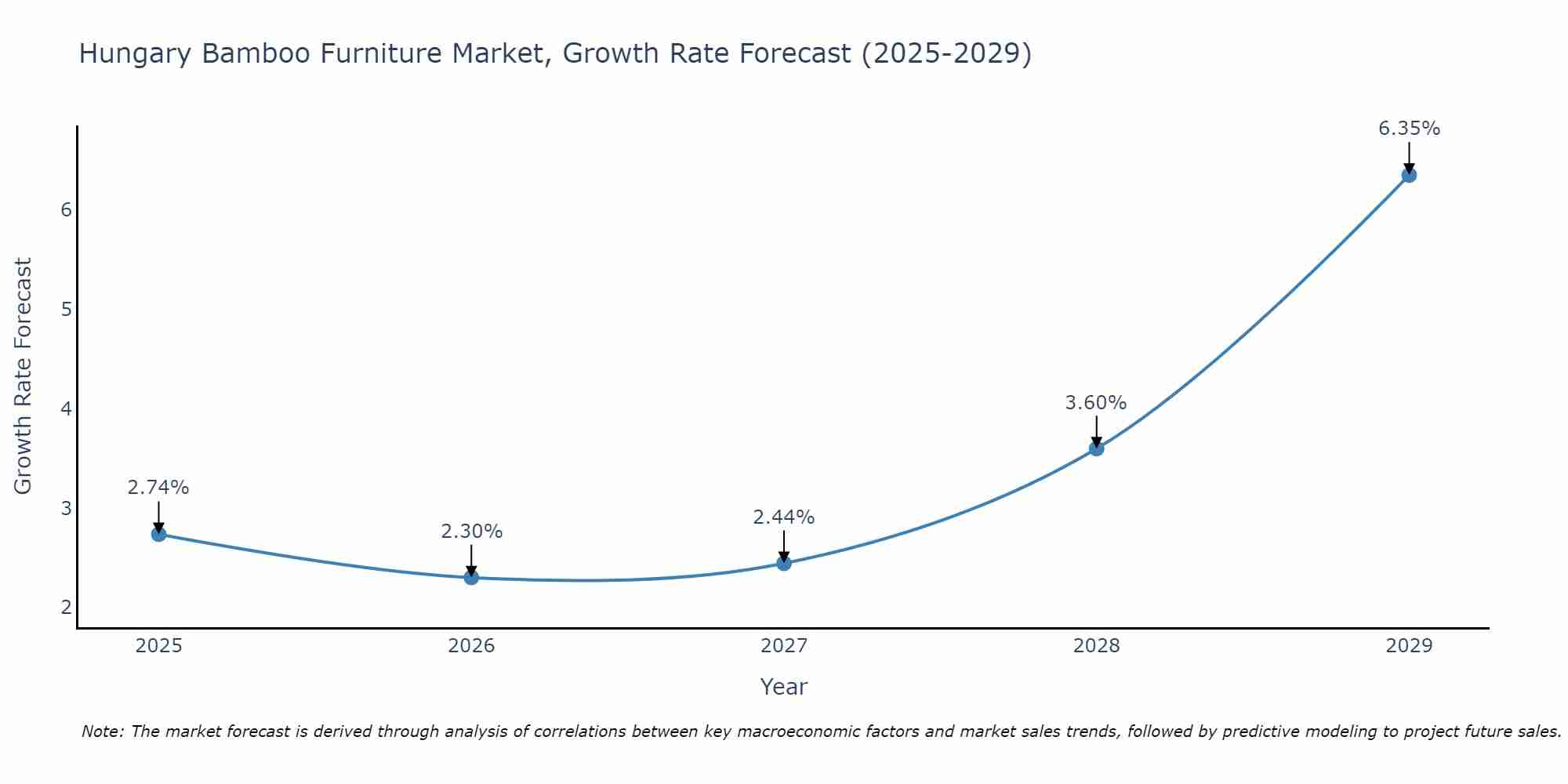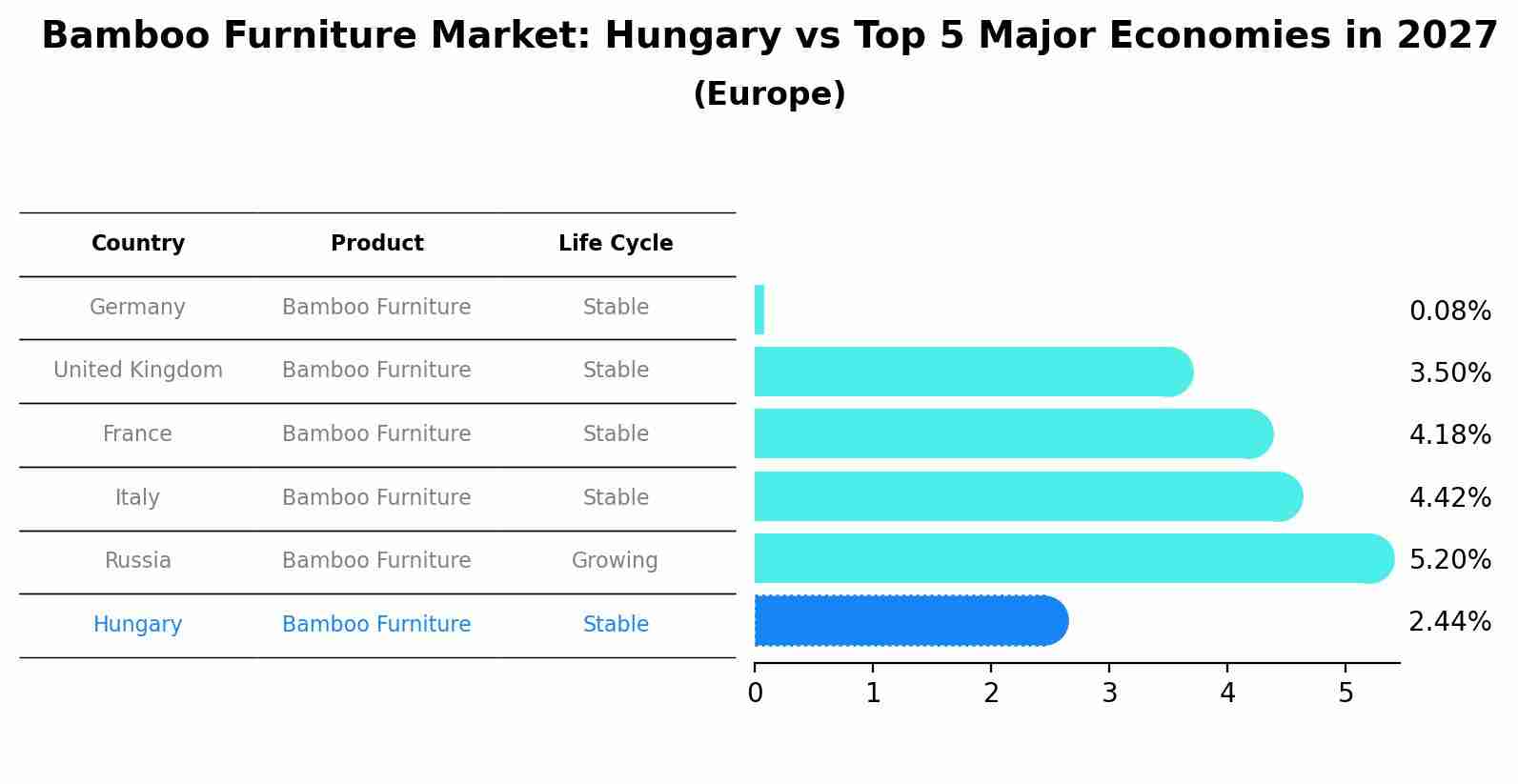Hungary Bamboo Furniture Market (2025-2031) Outlook | Analysis, Trends, Size, Industry, Companies, Revenue, Value, Forecast, Share & Growth
| Product Code: ETC370879 | Publication Date: Aug 2022 | Updated Date: Jul 2025 | Product Type: Market Research Report | |
| Publisher: 6Wresearch | Author: Shubham Padhi | No. of Pages: 75 | No. of Figures: 35 | No. of Tables: 20 |
Hungary Bamboo Furniture Market Size Growth Rate
The Hungary Bamboo Furniture Market is projected to witness mixed growth rate patterns during 2025 to 2029. Commencing at 2.74% in 2025, growth builds up to 6.35% by 2029.

Bamboo Furniture Market: Hungary vs Top 5 Major Economies in 2027 (Europe)
By 2027, the Bamboo Furniture market in Hungary is anticipated to reach a growth rate of 2.44%, as part of an increasingly competitive Europe region, where Germany remains at the forefront, supported by United Kingdom, France, Italy and Russia, driving innovations and market adoption across sectors.

Hungary Bamboo Furniture Market Synopsis
The Hungary bamboo furniture market is experiencing steady growth driven by increasing consumer awareness of sustainability and eco-friendly products. Bamboo furniture is gaining popularity due to its durability, aesthetic appeal, and environmentally friendly nature. The market is witnessing a surge in demand for bamboo chairs, tables, beds, and cabinets as consumers seek stylish and sustainable furniture options. Key players in the market are focusing on product innovation, quality improvement, and expanding their distribution networks to cater to the growing demand. Government initiatives promoting sustainable practices and eco-friendly products are also contributing to the market`s growth. With a strong emphasis on environmental consciousness and a shift towards sustainable living, the Hungary bamboo furniture market is poised for further expansion in the coming years.
Hungary Bamboo Furniture Market Trends
In the Hungary Bamboo Furniture Market, there is a growing trend towards sustainable and environmentally friendly products, with consumers increasingly seeking out bamboo furniture as a more eco-conscious alternative to traditional wood options. This shift is driven by a heightened awareness of environmental issues and a desire for products that are both stylish and sustainable. Additionally, there is a rising interest in minimalist and Scandinavian design aesthetics, which often incorporate bamboo furniture due to its natural and versatile appeal. Manufacturers in the market are also focusing on innovation and product development to meet the evolving needs and preferences of consumers, such as creating multi-functional pieces that maximize space efficiency. Overall, the Hungary Bamboo Furniture Market is witnessing a trend towards sustainability, style, and functionality.
Hungary Bamboo Furniture Market Challenges
In the Hungary Bamboo Furniture Market, one of the main challenges faced is the limited consumer awareness and acceptance of bamboo furniture as a viable alternative to traditional wooden furniture. This lack of awareness stems from a general misconception that bamboo furniture is of lower quality or less durable compared to other materials. Additionally, there may be challenges related to the availability of skilled artisans who can craft high-quality bamboo furniture, as well as issues with the supply chain and distribution networks for bamboo furniture products. Overcoming these challenges would require targeted marketing efforts to educate consumers about the benefits of bamboo furniture, investment in training programs for artisans, and improvements in the overall infrastructure supporting the bamboo furniture industry in Hungary.
Hungary Bamboo Furniture Market Investment Opportunities
In the Hungary Bamboo Furniture Market, there are significant opportunities for investment due to the growing trend towards sustainable and eco-friendly products. Bamboo is a highly renewable resource that grows quickly and can be harvested without causing environmental damage. Investing in the production and sale of bamboo furniture in Hungary can appeal to the increasing number of consumers seeking environmentally conscious options. Additionally, the durability and versatility of bamboo make it an attractive material for furniture manufacturing, offering opportunities for innovative designs and product differentiation. With the potential for market growth driven by sustainability trends and consumer preferences, investing in the Hungary Bamboo Furniture Market could yield long-term returns and contribute to a more environmentally friendly industry.
Jordan Agar Market Government Policies
The Hungarian government does not have specific policies related to the bamboo furniture market. However, Hungary is part of the European Union, which has regulations promoting sustainable forest management and the use of eco-friendly materials like bamboo. This indirectly affects the bamboo furniture market in Hungary, as manufacturers need to comply with EU standards on environmental protection and sustainability. Additionally, Hungary has various incentives and support programs for small and medium-sized enterprises (SMEs), which may benefit businesses in the bamboo furniture industry. Overall, while there are no explicit policies targeting the bamboo furniture market in Hungary, the broader regulatory framework and support for sustainable practices can impact the industry positively.
Hungary Bamboo Furniture Market Future Outlook
The Hungary Bamboo Furniture Market is poised for significant growth in the coming years due to increasing consumer awareness of sustainable and eco-friendly products. As people become more environmentally conscious, there is a rising demand for bamboo furniture, which is renewable, durable, and aesthetically appealing. The market is expected to benefit from the government`s initiatives to promote sustainable living practices and reduce carbon footprint. Additionally, the growing trend of minimalistic and modern interior design styles favors the use of bamboo furniture, further driving market growth. With advancements in manufacturing techniques and design innovation, the Hungary Bamboo Furniture Market is likely to expand, attracting both domestic and international customers looking for high-quality, environmentally friendly furniture options.
Key Highlights of the Report:
- Hungary Bamboo Furniture Market Outlook
- Market Size of Hungary Bamboo Furniture Market, 2024
- Forecast of Hungary Bamboo Furniture Market, 2031
- Historical Data and Forecast of Hungary Bamboo Furniture Revenues & Volume for the Period 2021 - 2031
- Hungary Bamboo Furniture Market Trend Evolution
- Hungary Bamboo Furniture Market Drivers and Challenges
- Hungary Bamboo Furniture Price Trends
- Hungary Bamboo Furniture Porter's Five Forces
- Hungary Bamboo Furniture Industry Life Cycle
- Historical Data and Forecast of Hungary Bamboo Furniture Market Revenues & Volume By Type for the Period 2021 - 2031
- Historical Data and Forecast of Hungary Bamboo Furniture Market Revenues & Volume By Chairs & Tables for the Period 2021 - 2031
- Historical Data and Forecast of Hungary Bamboo Furniture Market Revenues & Volume By Stools for the Period 2021 - 2031
- Historical Data and Forecast of Hungary Bamboo Furniture Market Revenues & Volume By Beds for the Period 2021 - 2031
- Historical Data and Forecast of Hungary Bamboo Furniture Market Revenues & Volume By Others for the Period 2021 - 2031
- Historical Data and Forecast of Hungary Bamboo Furniture Market Revenues & Volume By End User for the Period 2021 - 2031
- Historical Data and Forecast of Hungary Bamboo Furniture Market Revenues & Volume By Residential for the Period 2021 - 2031
- Historical Data and Forecast of Hungary Bamboo Furniture Market Revenues & Volume By Commercial for the Period 2021 - 2031
- Hungary Bamboo Furniture Import Export Trade Statistics
- Market Opportunity Assessment By Type
- Market Opportunity Assessment By End User
- Hungary Bamboo Furniture Top Companies Market Share
- Hungary Bamboo Furniture Competitive Benchmarking By Technical and Operational Parameters
- Hungary Bamboo Furniture Company Profiles
- Hungary Bamboo Furniture Key Strategic Recommendations
Frequently Asked Questions About the Market Study (FAQs):
- Single User License$ 1,995
- Department License$ 2,400
- Site License$ 3,120
- Global License$ 3,795
Search
Related Reports
- ASEAN and Thailand Brain Health Supplements Market (2025-2031) | Strategy, Consumer Insights, Analysis, Investment Trends, Opportunities, Growth, Size, Share, Industry, Revenue, Segments, Value, Segmentation, Supply, Forecast, Restraints, Outlook, Competition, Drivers, Trends, Demand, Pricing Analysis, Competitive, Strategic Insights, Companies, Challenges
- ASEAN Bearings Market (2025-2031) | Strategy, Consumer Insights, Analysis, Investment Trends, Opportunities, Growth, Size, Share, Industry, Revenue, Segments, Value, Segmentation, Supply, Forecast, Restraints, Outlook, Competition, Drivers, Trends, Demand, Pricing Analysis, Competitive, Strategic Insights, Companies, Challenges
- Europe Flooring Market (2025-2031) | Outlook, Share, Industry, Trends, Forecast, Companies, Revenue, Size, Analysis, Growth & Value
- Saudi Arabia Manlift Market (2025-2031) | Outlook, Size, Growth, Trends, Companies, Industry, Revenue, Value, Share, Forecast & Analysis
- Uganda Excavator, Crane, and Wheel Loaders Market (2025-2031) | Strategy, Consumer Insights, Analysis, Investment Trends, Opportunities, Growth, Size, Share, Industry, Revenue, Segments, Value, Segmentation, Supply, Forecast, Restraints, Outlook, Competition, Drivers, Trends, Demand, Pricing Analysis, Competitive, Strategic Insights, Companies, Challenges
- Rwanda Excavator, Crane, and Wheel Loaders Market (2025-2031) | Strategy, Consumer Insights, Analysis, Investment Trends, Opportunities, Growth, Size, Share, Industry, Revenue, Segments, Value, Segmentation, Supply, Forecast, Restraints, Outlook, Competition, Drivers, Trends, Demand, Pricing Analysis, Competitive, Strategic Insights, Companies, Challenges
- Kenya Excavator, Crane, and Wheel Loaders Market (2025-2031) | Strategy, Consumer Insights, Analysis, Investment Trends, Opportunities, Growth, Size, Share, Industry, Revenue, Segments, Value, Segmentation, Supply, Forecast, Restraints, Outlook, Competition, Drivers, Trends, Demand, Pricing Analysis, Competitive, Strategic Insights, Companies, Challenges
- Angola Excavator, Crane, and Wheel Loaders Market (2025-2031) | Strategy, Consumer Insights, Analysis, Investment Trends, Opportunities, Growth, Size, Share, Industry, Revenue, Segments, Value, Segmentation, Supply, Forecast, Restraints, Outlook, Competition, Drivers, Trends, Demand, Pricing Analysis, Competitive, Strategic Insights, Companies, Challenges
- Israel Intelligent Transport System Market (2025-2031) | Strategy, Consumer Insights, Analysis, Investment Trends, Opportunities, Growth, Size, Share, Industry, Revenue, Segments, Value, Segmentation, Supply, Forecast, Restraints, Outlook, Competition, Drivers, Trends, Demand, Pricing Analysis, Competitive, Strategic Insights, Companies, Challenges
- Uganda Precast and Aggregate Market (2025-2031) | Strategy, Consumer Insights, Analysis, Investment Trends, Opportunities, Growth, Size, Share, Industry, Revenue, Segments, Value, Segmentation, Supply, Forecast, Restraints, Outlook, Competition, Drivers, Trends, Demand, Pricing Analysis, Competitive, Strategic Insights, Companies, Challenges
Industry Events and Analyst Meet
Our Clients
Whitepaper
- Middle East & Africa Commercial Security Market Click here to view more.
- Middle East & Africa Fire Safety Systems & Equipment Market Click here to view more.
- GCC Drone Market Click here to view more.
- Middle East Lighting Fixture Market Click here to view more.
- GCC Physical & Perimeter Security Market Click here to view more.
6WResearch In News
- Doha a strategic location for EV manufacturing hub: IPA Qatar
- Demand for luxury TVs surging in the GCC, says Samsung
- Empowering Growth: The Thriving Journey of Bangladesh’s Cable Industry
- Demand for luxury TVs surging in the GCC, says Samsung
- Video call with a traditional healer? Once unthinkable, it’s now common in South Africa
- Intelligent Buildings To Smooth GCC’s Path To Net Zero













